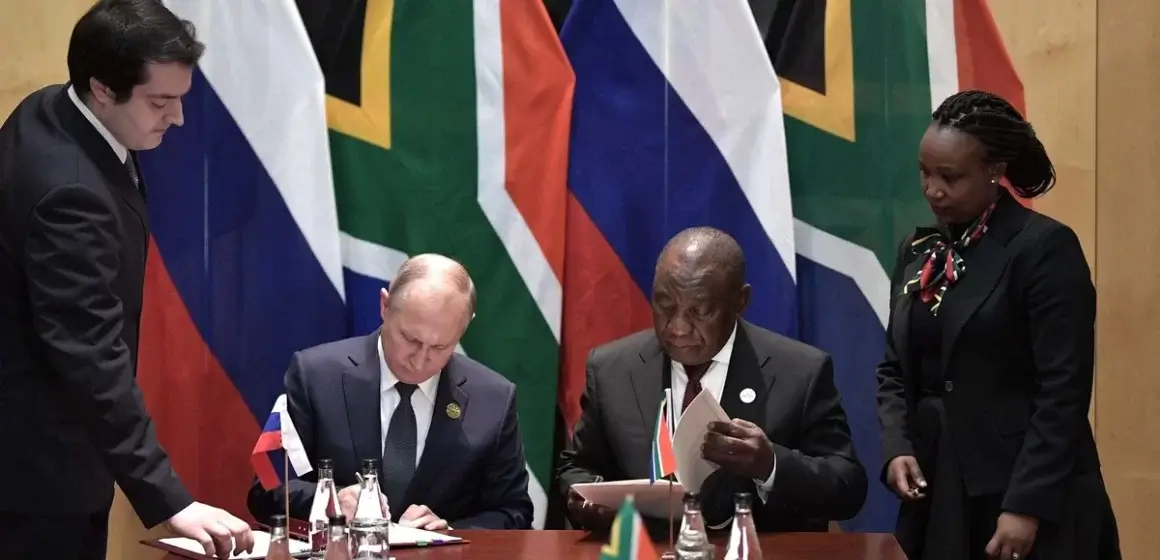|
LISTEN TO THIS THE AFRICANA VOICE ARTICLE NOW
Getting your Trinity Audio player ready...
|
A proposed agreement to grant visa-free access to South Africa for Ukrainian diplomats has ignited a heated debate in South Africa’s political landscape, ringing to the fore deep-rooted divisions over the nation’s stance on Russia. The agreement, publicly announced by South Africa’s Home Affairs Minister Leon Schreiber, a member of the Democratic Alliance (DA), stirred immediate backlash and questions regarding the country’s foreign policy alignment.
On Sunday, Schreiber took to social media to reveal what he described as a “historic agreement” allowing Ukrainian diplomats, as well as officials with service passports, visa-free entry to South Africa. His statement portrayed Ukraine as a “valued ally” and emphasized its support for South Africa during its anti-apartheid struggle. “This visa-free arrangement will enable diplomatic ease and strengthen ties with Ukraine,” Schreiber wrote. This announcement appeared to bypass official protocol, as it had not received formal authorization from President Cyril Ramaphosa, who later expressed disapproval of the announcement.
The presidency, led by Ramaphosa and the African National Congress (ANC), swiftly responded, condemning Schreiber’s announcement as premature and lacking presidential approval. Ramaphosa’s spokesperson, Vincent Magwenya, voiced frustration over the minister’s unilateral decision, asserting, “It is unclear how the minister can announce the signature of an international agreement without prior formal authorization.” Ramaphosa’s office clarified that South Africa’s diplomatic processes had yet to conclude, implying that any international agreement would require thorough government vetting and approval.
The backdrop to this diplomatic scuffle reflects broader political tensions in South Africa. The ANC, which has held power since the apartheid era, now governs through a coalition after losing its parliamentary majority in May’s general elections. The coalition, primarily shared with the DA, has exposed ideological rifts, particularly over foreign policy. While the ANC has historically maintained close ties with Russia, calling it a “valued friend” during a recent BRICS summit in Kazan, the DA has expressed more pro-Western leanings, openly criticizing Russia’s actions in Ukraine.
This divide in South Africa’s political alliance has left the government torn between its historical loyalty to Russia and emerging diplomatic overtures to Ukraine. The Economic Freedom Fighters (EFF), a vocal opposition party not part of the ruling coalition, condemned the proposed agreement as a “betrayal” of South Africa’s ties with Russia. Leigh-Ann Mathys, the EFF’s spokesperson, called the visa-free deal an “abandonment of our solidarity with Russia.”
Adding to the criticism, former President Jacob Zuma’s new opposition party, uMkhonto weSizwe (MK), also urged the government to reconsider, casting the deal as an imperialist agenda led by the DA to facilitate Western influence in South Africa. Nhlamulo Ndhlela, the MK’s spokesperson, sharply criticized the proposal as “an influx of defeated right-wing Ukrainians to South Africa,” accusing the DA of racially motivated, pro-Western imperialism.
The proposed visa-free arrangement now lies in diplomatic limbo. On Monday, International Relations Minister Ronald Lamola met with Ukraine’s Deputy Foreign Minister Andrii Sybiha to clarify that the agreement remains unsigned and is still under diplomatic review. Lamola stated that “all diplomatic processes need to be completed,” assuring that any formal announcement would only follow a full governmental review.











LEAVE A COMMENT
You must be logged in to post a comment.